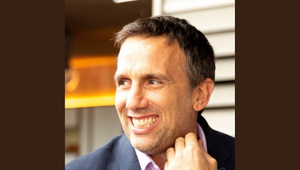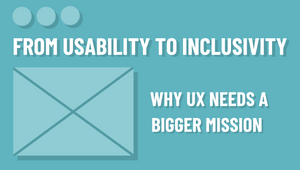
Mark Anderson Skipped School Because He Couldn't Afford the Bus. Now, He's an MD

Originally from Yorkshire, England, Mark Anderson began his agency career in London at the UK’s largest independent agency, which was later acquired by Publicis Groupe.
After working across several London agencies, he moved client-side as head of global marketing for a fashion retail business before relocating to Australia with his partner. Over an eight-year stint at Cheil, Mark drove transformational change, growing the business from 18 to 90 people and increasing revenue and profit by more than 500% — achievements that earned him a place in Campaign Asia’s 40 Under 40.
Now, Mark is back in the world of independents as managing director of Five by Five Global.
LBB> What was your first experience of leadership?
Mark> I think leadership has always been part of what I do. From a very young age at school, I was always someone to put my hat in the ring to help bring people together, lead a group and to try and gain the best possible outcome - anyone who knows me, knows I'm quite competitive (it’s best not to play Monopoly with me).
I first started to manage someone quite early on as an account manager, so the need to think beyond your own immediate needs was learnt very quickly, and I started to manage teams quite early on in my career.
I later gained a lot of leadership experience working with a Korean marketing agency [Cheil], where I became responsible for multiple teams and functions, and grew the agency from around 18 people to almost 90.
LBB> How did you figure out what kind of leader you wanted to be – or what kind of leader you didn’t want to be?
Mark> I’ve I learnt more from seeing what I didn’t want to be than anything else. I’ve worked for some great companies who had a real focus on people and culture -- working for Cadbury was a standout. There’s also been an odd leader along the way that I've admired and respected.
But what helped me the most was seeing what other people did that just didn’t resonate with employees or with me. `
Understanding and listening to your team is vital, understanding the differences in approach, attitudes and respecting the differences in cultures are paramount for successful leadership.
LBB> What experience or moment gave you your biggest lesson in leadership?
Mark> There’s been a few. Some I wish I could talk about. But my biggest lesson and takeaway is always stay true to yourself. This doesn’t mean don’t listen to others or take into consideration external factors, but it means don’t let how other people do business affect how you yourself want to do business, especially if people and culture is your priority.
During my career, I've managed and navigated a disproved leak investigation, and of course Covid-19 - two very big lessons in leadership. Protecting and supporting your employees wellbeing at every step of the way, and quickly learning to navigate uncharted territories was something I will never forget and learned so much from.
I was thankful to learn both of these alongside a trusted leader.
LBB> Did you know you always wanted to take on a leadership role? If so how did you work towards it and if not, when did you start realising that you had it in you?
Mark> Absolutely. I come from a challenging childhood. Often missing school for the sheer fact we couldn’t afford the bus fare. From a very early age I knew I wanted better, and I was prepared to work hard for it. I’ve worked continuously since the age of 12.
Being self-sufficient is in my nature and having a sense of personal control and responsibility was important to me.
Working for people who don’t care for you or your team only pushed me more to want to be in a position where I could influence positive change for others.
LBB> When it comes to 'leadership' as a skill, how much do you think is a natural part of personality, how much can be taught and learned?
Mark> I think some people are naturally good at certain things. I also think we are all shaped by our younger-selves and our experiences, and I think some people want to be in leadership to genuinely make a positive impact.
However, there are those that are typical ladder-climbers who just want to be in a senior position and the leadership component is just a bi-product, which means they don’t take these aspects seriously enough or perhaps have a slightly distorted view of them.
Being financially successful doesn’t make you a good leader - just look at the history of American Apparel.
LBB> What are the aspects of leadership that you find most personally challenging? And how do you work through them?
Mark> Trying to do what’s right for them, despite not always being able to give them what they want or need. Often employees will be frustrated with certain decisions, outcomes and policies that you yourself cannot change, despite your best efforts.
Unless you own the business, you are often answerable to other powers, and often you work with people whose values and focus on people and culture are just different.
I always say, I want to be in a position where I can make a positive impact. If I find myself not being able to do that, then it’s not for me.
LBB> Have you ever felt like you've failed whilst in charge? How did you address the issue and what did you learn from it?
Mark> 100%. I think you’d have to be a narcissistic person to think you get everything right.
I remember telling someone a while ago about my own imposter syndrome issues, and I was surprised to see how shocked they were. It’s great to know people don’t always see this, but that constant internal critique is what I think keeps driving me and what keeps me honest with everything I do.
While I know what I do behind the scenes to push things forward, it’s hard to lose great people because of certain decisions outside of your immediate control.
Ultimately, in the eyes of the employee, you are part of that reason for them leaving, and that always makes me feel like I've failed them.
Everyone knows the saying “People don’t leave bad companies...” Ultimately people want/need someone to be unhappy with.
LBB> In terms of leadership and openness, what’s your approach there? Do you think it’s important to be as transparent as possible in the service of being authentic? Or is there a value in being careful and considered?
Mark> I always encourage people to be open, honest and respectful. I try to live by these three words myself. That doesn’t mean I can’t be direct or challenge people in the pursuit of making something better for everyone.
Being open doesn’t mean sharing everything though. For me, it means don’t be misleading. Sometimes you have to be careful and consider what you say, and when you say it, so that unnecessary issues or concerns don’t arise.
But you have to make sure you tell people enough so that they don’t start creating their own false narrative. This is something I've seen done terribly wrong on many occasions. Anyone who knows me will probably know me for my diplomacy.
However you can probably always tell what I'm thinking - I’d be a terrible poker player.
LBB> As you developed your leadership skills did you have a mentor, if so who were/are they and what have you learned? And on the flip side, do you mentor any aspiring leaders and how do you approach that relationship?
Mark> To be honest, no. I’ve always observed what others do that creates frustration, disempowerment and negative sentiment. I simply learn from this and try not to take inspiration.
I do always remember looking up to a couple of people -- who sadly are no longer with us -- but my old client services director at Chemistry in London, Ingrid, and the creative services director, Deb, both were people I learned so much from and still inspire me to this day. They were firm but fair. They were supportive, and I enjoyed working with them.
Jayden, a recent CEO I worked with, was also someone who was always willing to listen and discuss, and I respected him greatly for this. I haven’t been a mentor specifically, but it’s been very nice to receive messages from ex-line reports who have gone on to do very well and send messages of appreciation for the way that we worked together. It’s nice to know you get it right sometimes.
LBB> In continually changing market circumstances, how do you cope with the responsibility of leading a team through difficult waters?
Mark> Resilience is something I established very early on in life and in my career. Anyone who knows me, knows I'm not afraid of difficult discussions. I don’t think you should be in leadership roles or management positions if you’re not prepared to lead your team through difficult times.
Having someone to confide in and talking through your problems is always a massive help. Being outspoken and determined to make things better means you're not bottling anything up and you always have hope (and some confidence) that things will always turn out right in the end.
LBB> As a leader, what are some of the ways in which you’ve prioritised diversity and inclusion within your workforce?
Mark> As someone part of the LGBTQIA+ community, I have faced discrimination throughout my life and also in the workplace. For me, it’s always come naturally. I was incredibly proud of having a team of 90 people made up of 17 different nationalities, and pushing for initiatives that support groups including the LGBTQIA+ community.
The world has come so far, but sadly there is still so much that needs to be done in some organisations to stamp out discrimination. I always partner very closely with P&C/HR teams and make it a focus of mine.
Recognising cultural sensitivities and encouraging people to celebrate and share their cultures is very important to me, whether this be through a multicultural office potluck, holding an event for Diwali, or turning a lift into a Mardi Gras celebration of love and equality.
LBB> How important is your company culture to the success of your business? And how have you managed to keep it alive with increases in remote and hybrid working patterns?
Mark> I cannot emphasise this enough: It is the most important factor. People are our business. I’ve always pushed people (even when they don’t want to), to come into the office on set days and set frequencies.
We’ve all enjoyed the extra money we save on fuel, parking, and day-care during and post- Covid, but the impact this has on your business, culture and how people interact with each other can be detrimental if not managed carefully.
The important thing is to learn and evolve.
The world has changed massively, but the need for physical, human interaction and collaboration will always be important to our success and enjoyment.
LBB> What are the most useful resources you’ve found to help you along your leadership journey?
Mark> I’d love to say a certain book, journal or online publication, but for me, it’s partnering with HR and people and culture teams. If people are your business, then you need to make sure you understand your people and do what you can for them. If they succeed, the business succeeds. Aside from this, the best resource is actually spending time with your team, listening to them and continually learning from them.















